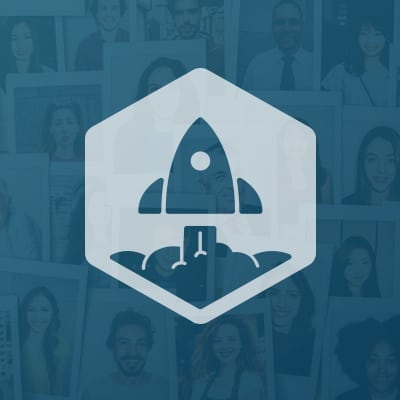Being an American founder in the Valley is difficult enough, but as a European founder, what unique concerns do you have to think about while running a company and trying to scale it?
Teddie Wardi, Partner at Atomico, leads this session with Mathilde Collin, CEO of Front App; Jens Nylander, CEO of Automile.com; and Nicolas Dessaigne, CEO of Algolia, to discuss the challenges they went through in raising their first venture rounds in Europe, how they sought out Silicon Valley VCs when the time was right, the importance of pitch decks and the major difference between European and American pitching styles.
And if you haven’t heard: SaaStr Annual will be back in 2018, bigger and better than ever! Join 10,000 fellow founders, investors and execs for 3 days of unparalleled networking and epic learnings from SaaS legends like Jyoti Bansal, Aaron Levie, Josh James, and Dustin Moskovitz. If you don’t have tickets, lock in Early Bird pricing today and bring your team from just $549! (Prices go up July 1st.) Get tickets here.
TRANSCRIPT
David Appel: Good afternoon, everyone. My name is David Appel. I’m Head of the Software and SaaS Vertical at Intacct, where we’ve been very happy to be the sponsor of the tactical stage here at SaaStr. This is our last and final seminar. It’s going to be a great session. I got a question for the crowd. How many people here are European?
[laughs]
[audience reaction sounds]
David: Welcome! What timezone are you on?
[laughter]
David: Thank you for coming. You probably already know some of these people, all of these people, in the background. We were talking a little bit about what the session’s going to be about. This for you. This is their story. What did they go through? How have they made the decisions that they have on building their businesses? Particularly, on how they went about raising funding.
We’d love for you, in the time you’re spending with us, to walk away, that’s our investment back in you, to learn some of the lessons they went through, so you can avoid the bad, double down on the good. We’ve got four great speakers coming on right now. I’m going to let them introduce themselves as they come on up.
I don’t want take away from the moderator. Teddie, come on up.
Teddie Wardi: Thank you.
[applause]
Teddie: All right. I think, let us all get on stage. We have a great group of European founders today. We have two French founders, one Swedish founder…two of you guys have done YC. Jens has done the YC of life, as he told me a few days ago.
Jens Nylander: [laughs] That’s right. YC of life.
Teddie: The common theme is, all of you have raised money from Jason Lemkin in one way or another. [sarcastically] It’s a huge coincidence you ended up on stage here today.
Mathilde: [laughs]
Jens: [sarcastically] Big coincidence.
Teddie: We’re going to talk about the stories of fundraising…the good, bad, and ugly, of European SaaS founders fundraising for their businesses. Let’s start with you, Nicolas. You had US venture funders already in your seed stage. Then you end up raising a round in Europe. Can you tell us a little bit about that, how you’ve kind of been back and forth?
Nicolas Dessaigne: Sure. I’ll be honest, when we were fundraising for our series A, we mostly spoke to US investors. Then what happened is that the most bullish investor actually was the one who had known us for the longest, with whom we had a long relationship, and that’s how we ended up with Accel UK, and Philippe.
Philippe had known us for like three years before, so he saw the progress of the company along the years. I think that it really was a key part of having him being probably bolder on one side than the others. Then, it was a great brand, anyway…Accel, global brand. For us, it was a good one anyway.
The fact that it was from the UK was also in a way an advantage, given that we already had US investors. He knew what it took to go from Europe to US.
Teddie: Jens, for Automile, you ended up raising your A round from a very well known US VC called the SaaStr Fund.
Jens: That’s right. We were the first investment in the SaaStr Fund that was, I think it’s $75 million or something similar in that. I was still partially living in Europe at that stage. Something I learned with Jason Lemkin is that he spends a lot of time during the due diligence phase, with your customers. He’s learning what makes Automile so great.
What I learned during that phase is that he already made up his mind regarding me as a founder. He wanted to invest into me and wanted to know how good is this product really. He also were knowing that this is a big market, it’s a $30 billion market.
Ultimately, I think what really killed it is that he basically talked a lot with the customer before making up his final mind and giving me a term sheet. Even having multiple term sheets, you always want somebody that has traction, that has a record, can support you as a founder, can help you with all difficult decisions.
I think that is Mr. Lemkin. He helps you with these difficult decisions.
Teddie: [laughs] All right. The sales and marketing pitch is done…?
[laughter]
Teddie: Mathilde, you’re like an expert in this topic. You even wrote a long form blog post about the difference of when you’re raising a seed round in US and Europe. Then, you’ve gone on to raise series A and so forth. Do you feel that same dynamics apply to series A? What have been your key learnings when you talked to investors at both sides of the Atlantic?
Mathilde Collin: For me, I think the reason we raised a seed in the US is mainly because we couldn’t raise in Europe. Which I think, was not true for our series A, I think we could have raised, but I just enjoy my experience working with American VCs. As a European founder, I have a lot of European roots. I think I needed a bit more American touch in this company, and that’s why we chose Social Capital for our series A.
Teddie: A lot of people in Europe say that, “Oh, you can’t raise money from US VCs if you don’t completely relocate your business to the US.” Let’s try to debunk that myth a little bit. How did you guys go about it? What functions did you move before you raised your round? Maybe Jens can…
[crosstalk]
Jens: I only move myself.
[laughter]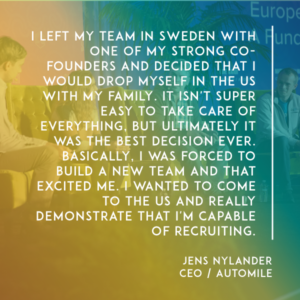
Jens: I left my team in Sweden. I left them with one of my strong co founders and I decided that I would drop myself in the US only with my family, three kids. It isn’t super easy to take care of everything, but ultimately that was the best decision ever. Basically, I was forced to build a new team, and that excites me.
On top of that, it’s freaking hard. Every day I woke up like, “I need to find these great people I need to hire.” Ultimately I did it. We have 20 people today. I believe that it depends on what you’re looking for. Some founders bring their full team with them. They lose a few ones on the way, but ultimately, it depends on what you’re looking for.
I was looking for really coming to US, really showing and demonstrating that I’m capable of recruiting. That was my ultimate goal from the beginning…and leaving the Swedish team still working on the European market.
Teddie: Nicolas, how did you go about it?
Nicolas: Actually, when we raised our series A, we didn’t have really anyone in the US yet. We were already headquartered here, we already had most of our customers here. It was a lot of back and forth, and a lot of hustling.
I was committed to moving. It was not a question of, “Am I going to move or not?” The team would stay in Paris anyway. All the tech teams stayed in Paris. It has never been a problem actually, never been a question from investors.
Teddie: You think about the US, there’s this, again this meme in Europe that, “Oh, if you are recruiting in the US all the resumes are super inflated, and you need this culture of like, everything is pitched really hard. You have to be almost overselling, and forget all the modesty.”
Does this also apply to when you were pitching US investors? Or would you tell the story in the same way as you would have told it in Europe? Mathilde, how do you…?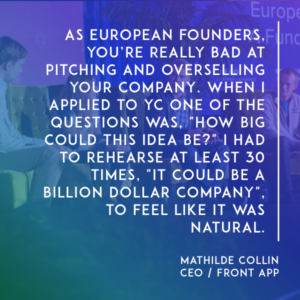
Mathilde: I think it’s true. I think as European founders you’re really bad at pitching and overselling your company. I have this funny story where when I applied to YC, one of the questions was, “How big could this idea be?” I had to rehearse at least 30 times…It could be a billion dollar company, to feel like it was natural.
Then, I went to YC and I asked someone that was American, “How big do you think this company could be?” He was like, “Obviously, a billion dollar company.” It was so natural. I think we have a slight disadvantage on that. For hiring, pitching customers, I do think that we need to improve on that, and I worked on that.
But for fundraising, I think it’s one of the only times where if you have good numbers, it doesn’t really matter to oversell anything. I think you need to be patient and have good traction. For us, at least, it worked out, for seed and series A.
Teddie: What about the rest of you? Did you notice that change of pitch somehow?
Jens: Well, I’m a salesperson from the beginning. I always try to sell. That means that you always try to do your best pitch. I believe that coming to US, you have to be clear about your goals and your visions. You should be bold about it. You should not be afraid of telling the VCs that, “This is my vision, this is what I want to achieve.”
Even if you are yourself, only one person sitting in a garage, you can still be bold and tell them that vision. It doesn’t matter that you’re not there today. You’ll be coming in that direction in the future. I think that matters when you come to US, that you have to be clear on that.
Overselling, I would say that we Europeans, we are pushing ourselves down a little bit. Sometimes I think we should just put ourselves up a little bit. That’s what I have learned.
Mathilde: I think coming here in the US is a good way to push you up. When you’re in Europe, and you’re just watching social media, or looking or watching SaaStr, etc., it seems like American founders are far better than you are, and you have this shitty company that no one wants to use.
[laughter]
Mathilde: The truth is, the first time I came three years ago and I was showing the product, everyone was telling me, “Whoa, this is amazing.” Then I was looking at the products of our competitors that had such great websites and marketing assets. That’s when I think I built my confidence.
Then you can see, like for real, how potential customers ranked your product versus other products.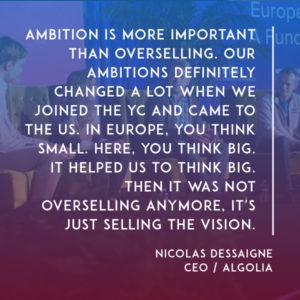
Nicolas: I think that’s exactly the right point. Ambition is more important, actually, than overselling. I don’t think I ever oversold like the company or metrics or anything However, our ambitions definitely changed a lot when we joined the YC, and when we came in the US. Being at the contact of local founders kind of showed us the way to free our mind.
In Europe you think small. Here, you think big. It helped us to think big. Then it was not overselling anymore, it’s just like, selling the vision.
Teddie: It’s more about painting the really big vision and being bold enough to think big…?
Nicolas: You still need to believe in your own vision.
Teddie: Yeah.
Jens: For some reason, US companies, at least startups in the Valley, has more respect from bigger enterprises. I don’t say it’s easy to sell to enterprises when you’re small, but it’s easier to be in the Bay Area. You have a lot of respect just because you’re innovating stuff, you’re disrupting stuff…
They believe in you, so it’s easier to get people to visit you here, actually. Specifically from the enterprise sector.
Teddie: When you were looking for investors, what were you really looking for? In terms of…Were you looking for somebody who has vertical experience in what you were doing? Or you were just looking for overall good quality of investor, or access to customers?
Was there a specific angle when you were choosing who was going to be the lucky one to fund your company?
Mathilde: For me, really, it came down to who I enjoy having dinner with. For our series A, we had term sheets from amazing investors. The reason I chose Mamoon from Social Capital was just because I’ve had known him for two years, I trusted him.
I think the main thing about the way I think about it is I think building a company is super hard, even if you’re doing well. If you’re not feeling good when you’re going to your board meeting, I think it’s just like adding a lot of pressure. Whereas I trust Mamoon, so whenever I go to a board meeting, I know that I’ll do my best.
He will help me, and I’m not scared at all. That’s how I choose.
Jens: Mathilde is telling us a great story here that I have to repeat. Basically I think the same way, that it’s all about that trust and engagement from the investor. It’s a little bit like dating. You are meeting, meeting…and then, you may get excited yourself about this investor…and the investor gets excited about you.
Then it’s the time to try to move to a term sheet, of course.
[laughter]
Jens: Independently, not spend too much time in the due diligence phase. I think that engagement that the investor believes in you truly, and also in some way wants to support you, and it’s really difficult. It’s hard. It could be stressful. It could be hard to go to a board meeting without having a full deck or a bad deck, or whatever…a bad day.
That’s when it matters to have great investors that really believes in you, and wants to support you. It goes like that, and it goes like that…Even if you’re a great company, sometimes it will go like that. It’s just fundamentally in all companies.
Teddie: Talking about the process which you mentioned, the dating phase, I’m not going to get too much in that analogy, but, how long did it take you guys to raise your series A from the first serious conversations with investors?
Nicolas: It was a bit special, because in a way we got pushed towards…with a lot of external interests. We were like, “Oh, that’s the right time.” Between the time, we thought it was the right time to sign the term sheet, maybe six weeks. It worked really well. We had built a lot of relationships with the key investors we wanted to speak to before that.
That helped a lot. They didn’t have to discover the company, they already knew a lot. They had never seen a pitch deck, yet. It was only conversations. That helped to create that engagement, that understanding, that trust, that helped them to go faster.
Mathilde: For our series A, it took literally six days. It’s pretty unusual. What happened is I had built a relationship with a few SaaS investors. Byron Deeter who is speaking at the moment, was one of them. He gave us a term sheet, whereas we’re not raising, it was expiring six days after.
He was a great investor, so I called a few investors that I knew, and told them I will make a decision by the end of the week. I think it can seem easy, too easy. The truth is, I had worked a lot with them before, always telling them about our progress and explaining what our vision was. It was six days, but a lot of time was invested before.
Jens: There’s no general answer. It could take one day to raise money, it could take four weeks, it could take three months, and you should not feel a pressure if it takes three months. It depends on that kind of relationship you have been building with investors.
If the investor is not ready to commit, it will likely take longer time to build that commitment and consensus in the partner team, if there’s multiple partners involved. I think in our series A, actually our seed round also, most of the things were closed within, I would say, four weeks.
Seed round went really fast. Series A took a little bit longer because we have multiple options…they wanted to review them.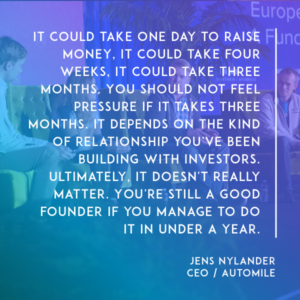
Ultimately, I think it doesn’t really matter. If it’s three months, or four weeks, or whatever, you’re still a good founder if you manage to do it in under a year, I would say.
Teddie: It all sounds really, really, easy. Like six days Series A or whatever. Let’s talk about that other side. What were the biggest mistakes you guys did when you were doing your fundraising, at whatever stage you want to talk about?
Nicolas: Raising before YC, if I can simplify?
Mathilde: [laughs]
Nicolas: No…in the end, it turned out OK. If I had one mistake, maybe that was our very first seed round that we did in Europe before joining YC. In hindsight, of course that was a mistake. It would have been better to come here first, but you need to learn.
Jens: For me personally, since I’m a guy that believes strongly in customer relationships, I’m always giving my customer relationships to the investors that are willing to invest into us. The mistake I’ve been doing, maybe more than once, is that I’m giving them too early. That’s bad and good.
The bad thing is that these customers are getting a few calls [laughs] . The pressure that we are putting on the customers doesn’t equate to really the interest of the investor. I would say that in the future I will be more restrictive of giving out my references before I really know that this investor really wants to invest and wants to work with me and my team.
Mathilde: I think the biggest mistake that I did is not being aggressive enough. For our series A, now that I look back, I knew that we could have had better terms. I think it’s like this European thing. I was probably not confident enough when I raised money. I thought, “OK, if I can do it in six days, I’ll do it in six days, and I will not look at what other options are.”
I think it was a mistake.
Teddie: To end, we’re going to do a quick fire round that I’ve adopted from my colleague Harry Stebbings, “The Twenty Minute VC” podcast. We’ll be going a bit faster. I’ll be giving you two options, and you pick the one that feels right and comes to mind quickly. Nicolas, let’s start with you.
Growth or retention?
Nicolas: Retention.
Teddie: Jens, outbound or inbound?
Jens: You know that I have my sales team listening here?
[laughter]
Jens: It’s inbound. I love you guys, but inbound is very important.
Teddie: Mathilde, on pricing. Modular or all inclusive?
Mathilde: All inclusive.
Teddie: Let’s do another round. Nicolas, Paris or San Francisco?
[laughter]
Nicolas: I got my team, too. [laughs] San Francisco.
Teddie: Jens, Mr. Robot or Westworld?
Jens: It’s Westworld. All, all in. [laughs]
Teddie: Mathilde, Slack or email?
Mathilde: Email, of course.
[laughter]
Teddie: I’m going to ask the same one for all of you…Mathilde, hard work or lucky break?
Mathilde: Lucky break. I’m French.
[laughter]
Teddie: Jens.
Jens: I don’t know. I have no good answer on that question.
Teddie: OK, next one.
Nicolas: Can I say both?
[laughter]
Teddie: OK.
[crosstalk]
Teddie: …both. This wasn’t a very impressive last round.
[laughter]
Teddie: Just for the ending, one key tip for someone, a European founder who’s raising their series A or think of raising it, what’s the one piece of advice you would give them? Nicolas?
Nicolas: Nurture your investors…the investors you think are going to be the good one for your series A. When I say nurture, don’t spend too much time, but a call here and there. It’s always useful to keep them up to date.
Jens: Would you like market the automation software for that? [laughs]
Nicolas: I don’t, but I should. It’s really getting them excited about the next round, and making sure they are excited all along and not discovering you are raising two weeks before.
Jens: I would say the deck. Mathilde has shared her deck. Now it’s super simple for everybody to raise $10 million. I haven’t shared mine yet. Have you shared yours?
Mathilde: [laughs]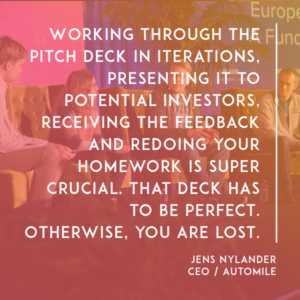
Jens: Independently, I think working through the deck, in iterations, presenting it to potential investors, receiving the feedback and going back, and redoing your homework…it’s super crucial. That deck has to be perfect. Otherwise, you are lost. That’s my key advice.
Mathilde: I think if it’s for European founders, specifically, I would say two things. One is, you should come here. I know that some people will watch that talk. I think the best thing that happened to Front was when I decided for the first time, three years ago, to come here and actually pitch to American VCs.
I had never been outside Europe before. It was a big deal for me to come here. I think that’s one thing that I did really well. The second thing, I forget about it. [laughs]
Teddie: You only need one, so it’s good.
Mathilde: Ok, cool.
Teddie: That’s it for our panel. Thanks so much, everyone, for coming. I’m sure you can grab these guys afterwards, for any more tips on fundraising. Thank you.
Jens: Thank you, everyone.
Mathilde: Thank you.
Nicolas: Thank you.

